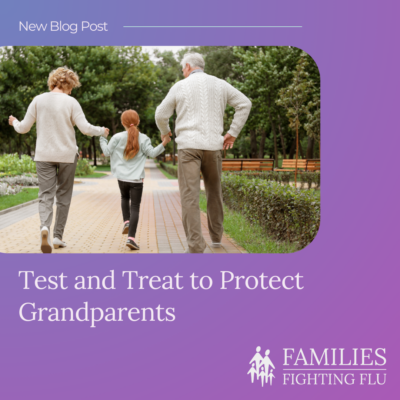- Advocacy
- Flu Prevention
Test and Treat to Protect Grandparents

While the winter holidays are long behind us, glimpses of spring-like weather remind us that future gatherings are right around the corner. As we start planning those gatherings with our loved ones, now is a great time to equip ourselves with the knowledge and tools necessary to protect them— especially our cherished grandparents.
Below, we’ll explore the importance of flu prevention, the role of testing and treatment, and practical steps you can take to keep your loved ones safe and healthy.
Why Flu Prevention Matters
Influenza, commonly known as the flu, is a highly contagious respiratory illness caused by influenza viruses. While most people recover from the flu with rest and fluids, it can lead to severe complications, hospitalizations, and even death in older adults and individuals with underlying health conditions.
According to the U.S. Centers for Disease Control and Prevention (CDC), people 65 years and older bear a greater burden of serious flu-related illness compared to other age groups during most flu seasons. Recent seasons continue the trend with about 70 to 90 percent of seasonal flu-related deaths in the United States occurring among those 65 years and older.
While we all want our grandparents to live long and healthy lives, flu prevention matters for several other reasons:
- Promoting Public Health: Influenza is a highly contagious respiratory illness that can spread rapidly within communities. Slowing the transmission reduces the overall impact of the disease and protects public health, which can be particularly important during pandemics or when circulating strains are particularly virulent.
- Reducing Healthcare Burden: During flu season, healthcare facilities often experience increased demand for services, including emergency room visits and hospital admissions. Preventing flu cases through vaccination and other preventive measures alleviates the burden on healthcare systems so that resources are available for more critical conditions.
- Preventing Complications: While most people recover from the flu with rest and fluids, some individuals may develop complications such as pneumonia, bronchitis, or sinus infections. These complications can be severe, leading to hospitalizations, long-term health consequences, and even death. The CDC estimates that so far this season 50 to 70 percent of flu-related hospitalizations have occurred in people over the age of 65.
Testing and Treatment is the First Line of Defense
Founded in 2004, Families Fighting Flu (FFF) has been steadfast in our mission to raise awareness about the seriousness of influenza and advocate for increased vaccination rates. Vaccination remains the single most effective way to prevent the flu and its potentially devastating consequences but it is not the only way you can keep your family safe.
Being proactive if you or a loved one begins to experience flu-like symptoms can make a major difference in outcomes for those who experience the flu. When symptoms first appear, don’t hesitate to contact your healthcare provider and request a flu test. These tests, which can range from rapid diagnostic tests to more comprehensive laboratory tests, can confirm whether you have the flu and guide appropriate treatment decisions.
The most common type of flu test is a rapid diagnostic test, which involves a quick throat or nasal swab and provides results in about 10 minutes. However, there are other ways to get tested for the flu virus and your healthcare provider can help determine the best option based on your symptoms and medical history.
If the test comes back positive for the flu, don’t panic. Instead, focus on taking the right steps to manage the illness and prevent complications. Your healthcare provider may recommend antiviral treatment medications, which can help reduce the severity and duration of symptoms while lowering the risk of complications, such as pneumonia and hospitalization.
You must follow your healthcare provider’s guidance closely and avoid close contact with others, especially vulnerable individuals like those over the age of 65 and others who may have compromised immune systems. If you need to leave your home or interact with others, wearing a mask can help prevent the spread of the virus and protect those around you.
Advocating for Your Health Beyond Flu Testing
Flu testing is just one piece of the puzzle when it comes to protecting yourself and your loved ones during flu season. If your flu test comes back negative but you’re still experiencing symptoms, don’t ignore them. Consider other potential causes and seek further medical evaluation if necessary. Staying informed about flu prevention strategies, such as washing your hands with soap and water, respiratory etiquette, and staying home when you’re sick can also help you do your part to keep older adults safe.
Taking proactive steps to prevent the flu and supporting each other during flu season is a collective effort that requires vigilance, education, and action. Together, let’s test and treat to protect our grandparents and all of those we hold near and dear.
Learn More About Families Fighting Flu
Families Fighting Flu (FFF), a national, nonprofit advocacy organization dedicated to honoring loved ones who have suffered serious medical complications or died from influenza, commemorates 20 years of advocacy protecting children, families, and all communities from the flu. Our 20th anniversary is a testament to our dedication and enduring efforts to protect families. It is also a sobering reminder that we are not done yet.
In sharing personal stories, FFF strives to increase awareness about the seriousness of the flu, reduce the number of hospitalizations and deaths each year, drive up vaccination rates for everyone six months and older, and encourage symptomatic individuals to get tested and receive appropriate treatment. Learn more about our mission and resources here so that you can empower your family to stay healthy this flu season.

